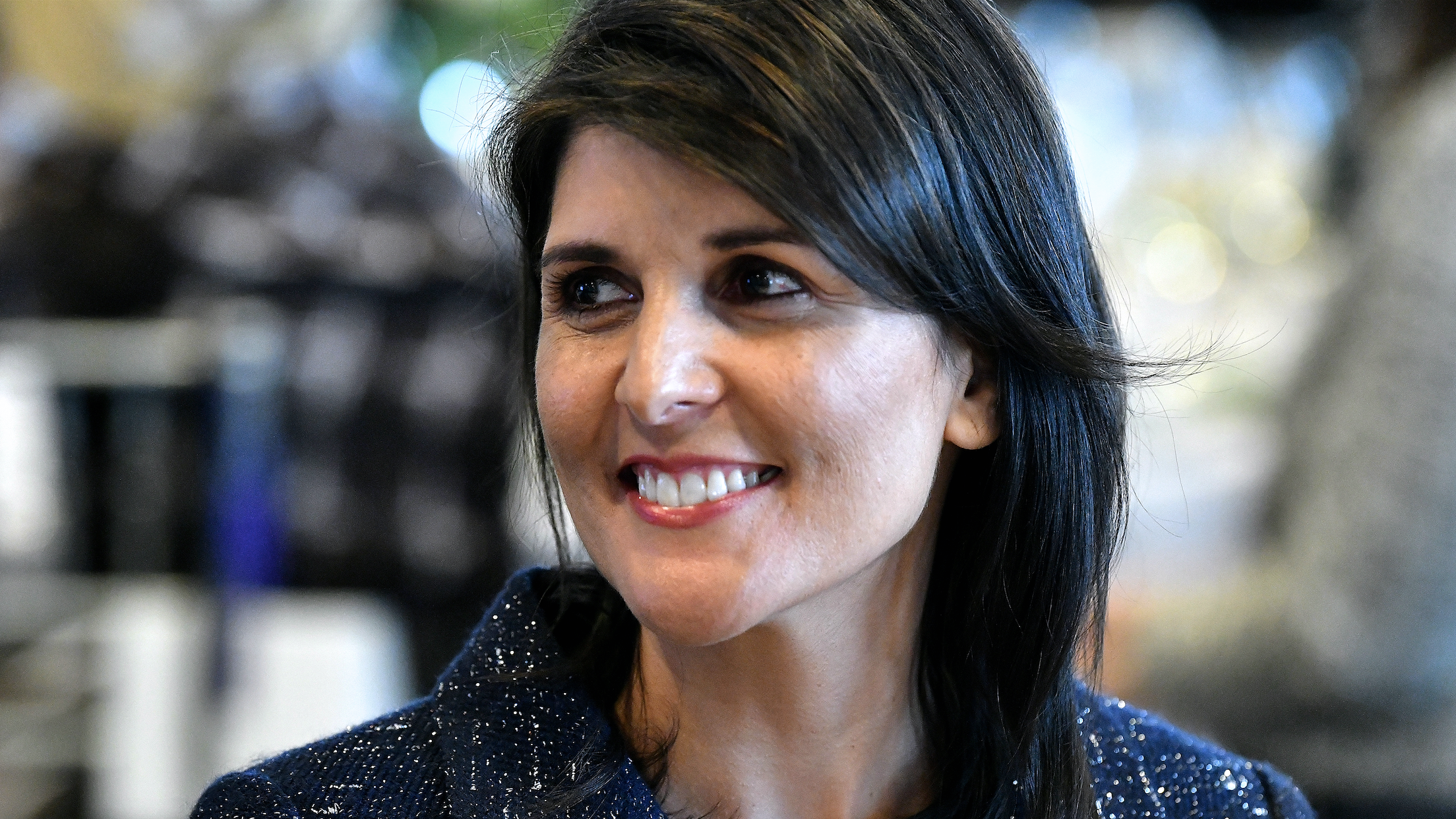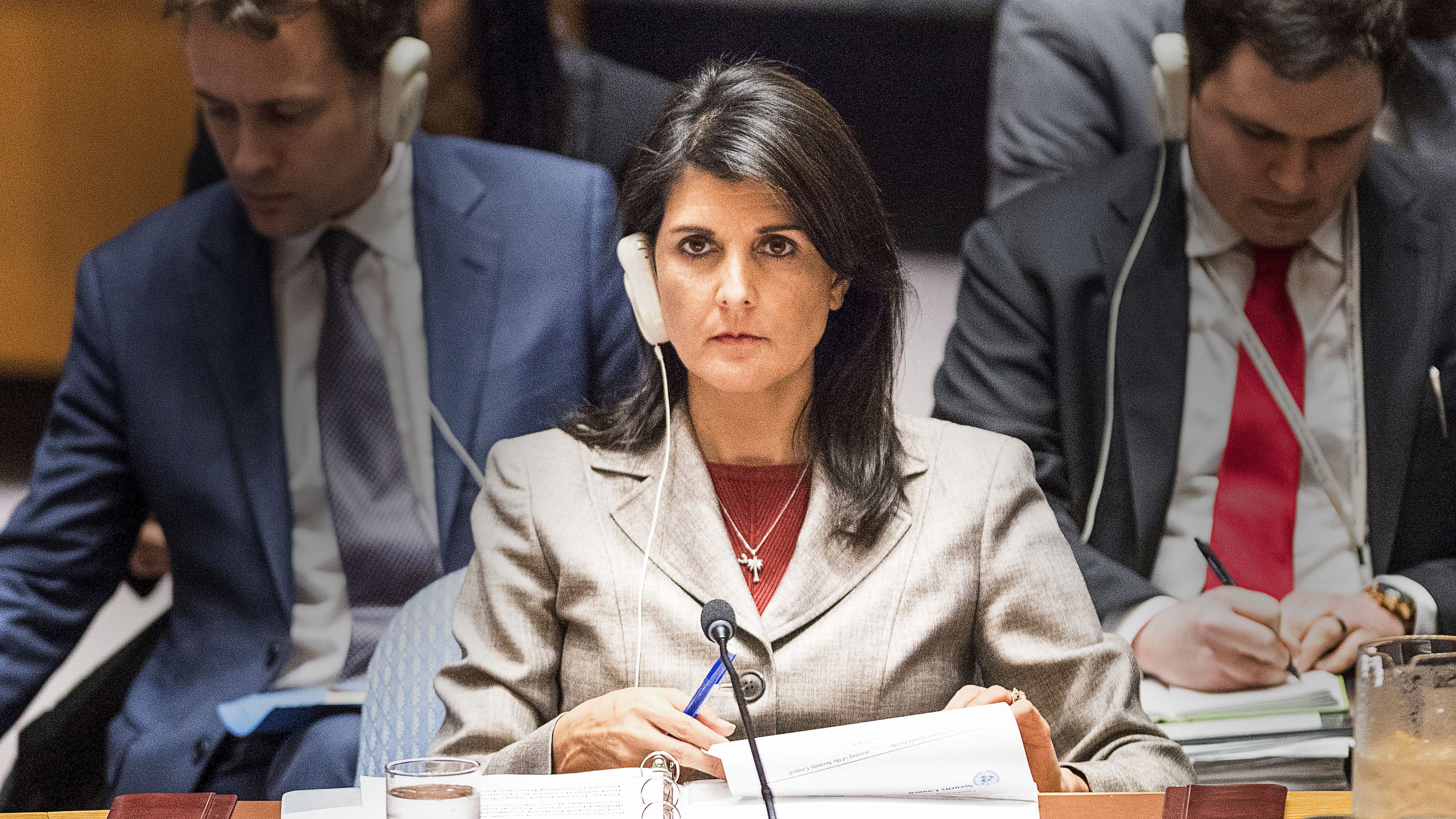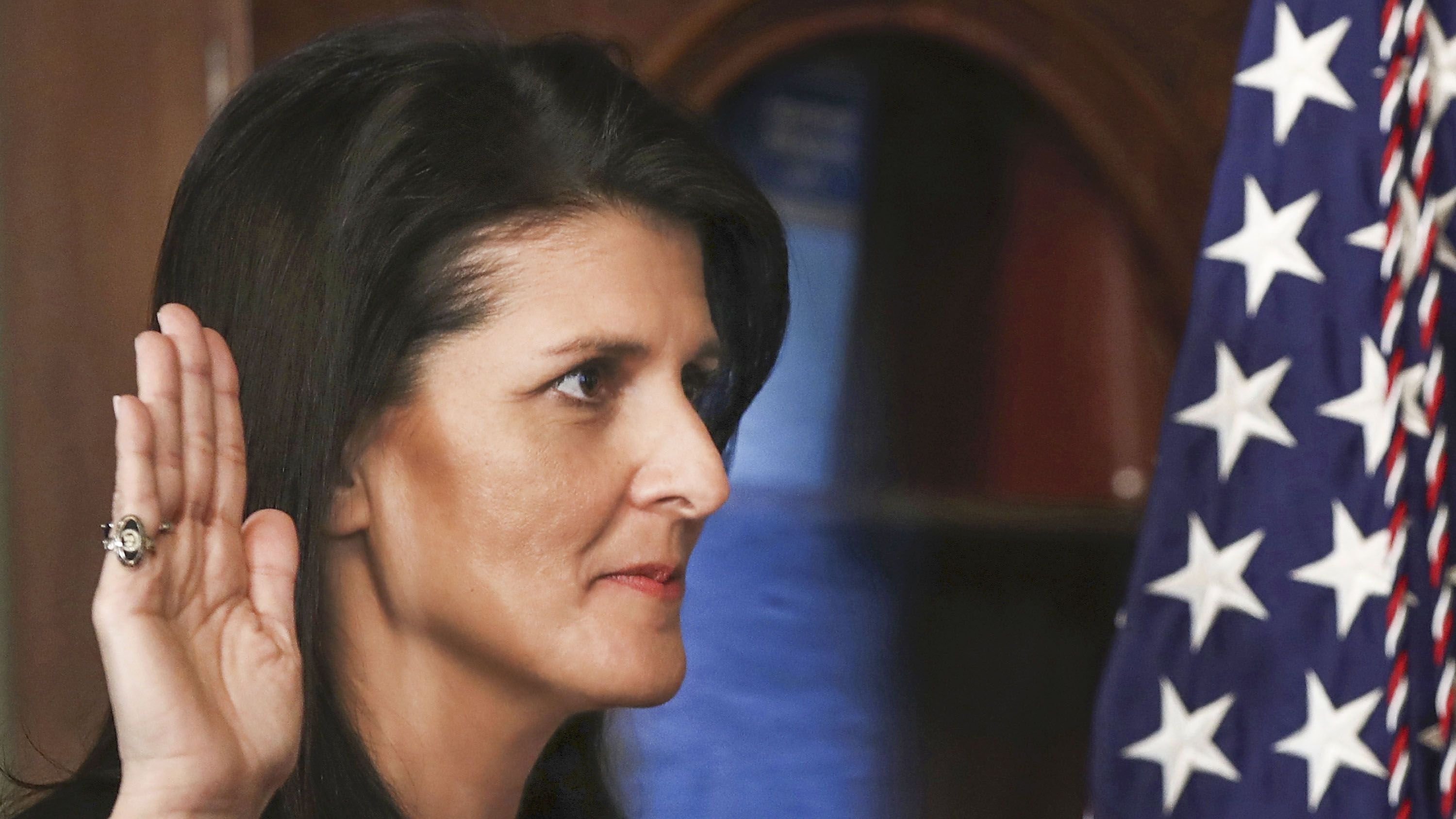Nikki Haley Talks Trump, #MeToo, and Running for President
Marie Claire sat down with U.S. Ambassador to the U.N., Nikki Haley, to talk American diplomacy, Trump's tweets, and the #MeToo movement.


Ambassador Nikki Haley has the tricky job of being the diplomatic face of an administration whose foreign policy is often set in motion by a president who tweets his thoughts to the world before most of us have even had our morning coffee. Suffice it to say, any given day can be quite a wild ride.
But rather than smoothing things over behind the scenes, Haley has been more visible and vocal than ambassadors past. She’s publicly disagreed with her boss, Donald Trump; successfully lobbied for tougher U.N. sanctions against North Korea; and had fiery words for Russia, calling the Kremlin’s election meddling “warfare” and saying the country “is not, will not, be our friend.”
Perhaps none of that should come as a surprise, since Haley has made a career out of being different. She was the first female governor of South Carolina and the second Indian-American to serve as governor of any state—and she's widely expected to run for president someday.
In an interview conducted in her office on International Women’s Day, Haley discussed the challenges facing female politicians, her response to all those presidential tweetstorms, and what she thinks of potentially being the first female president.
Marie Claire: What hurdles must women overcome to reach the highest levels of government, like you?
Nikki Haley: It’s hard for anyone to be in politics. Politics is not easy. The challenges women face from what I have seen is just having the strength to believe in themselves. Men tend to just do things, while women second guess themselves a lot, so what I wish for every woman is that they stop second guessing and trust their gut from the very beginning because it’s always right. Women in every arena, but also in politics, need to trust their decisions.
MC: Twice in your career, people have alleged you were having extramarital affairs; how did you deal?
Get exclusive access to fashion and beauty trends, hot-off-the-press celebrity news, and more.
NH: It’s a sad thing. What I’ve found is if you do your job well and if you get attention for doing your job well, people are going to want to bring you down. They do that to men; they do that to women. The difference is, with women, they immediately go not to something credible, but to the one thing that weakens them immediately. They throw out an affair allegation or something that implies something like that. When that happens, stand strong. Be proud and call them out because they don’t get the right to do that.
I laugh at it because it doesn’t mean anything—you expect it. But it bothers me more for my daughter and for girls growing up—that shouldn’t be the thing they are worried about, that if they get too loud or too good that they are going to have to face criticism.

MC: What do you think of the #MeToo movement?
NH: I love anytime women find the power in their voice, so I think the idea that women are stepping up and speaking out is important. I think the warning has been shot across the bow that you better think twice before you prey on a woman or victimize a woman in any way. What we have to make sure of is that we are responsible with the movement. That we realize the movement is not about these incidents that keep happening—it’s about changing the culture and changing the way things are and doing it in a way that we get the men to understand. I think we are at a very sensitive point with the #MeToo movement—it can either go too much to where men are going to be fearful of even working with women or it can be really good where men learn from women on what the barriers are.
MC: What is it like for you to be a high ranking woman in an administration that has a challenging record on women, from the Access Hollywood tape to Rob Porter?
NH: I’ve always seen my role as telling the truth. So no matter what the situation is, if you tell the truth, you are always going to be right in your own mind. Whether it’s the #MeToo Movement, whether it’s the rumors, whether it’s facing any other challenges that come along the way, I just try to be as honest as I can. And I’m not just honest with the public—I’m honest with the president. If I see something or hear something that makes me uncomfortable or that I think is going down the wrong path, I pick up the phone and I call him and he has always been very receptive to hearing me out, hearing what my concerns are, hearing what my thoughts are and taking them into consideration and that’s really all I could ask for.
"I love anytime women find the power in their voice."
MC: You’ve contradicted the president publicly. How does it feel to stick your neck out like that?
NH: If you stick your neck out, you have to stick it out responsibly. You have to do it in a way that doesn’t hurt anyone, but moves the ball, and so my statements are never about just getting something in the paper or pleasing the administration—it’s how do I get the truth out in a way that’s respectful of everybody? It wouldn’t work if we didn’t have a president who was receptive to that. He’s always been very supportive. He’s always appreciated what I have to say, but then I’m also very straight with him. If I see something that I don’t think is right, I am going to call you. I’m going to do it quietly—I’m not going to go and expose you publicly or try to embarrass anybody. You can make a difference when you do it that way.
MC: What do you make of the U.S.’s place in the world under Trump?
NH: Every country in the world now knows that we mean business. After the chemical weapons strikes in Syria, the president sent in those missiles the overwhelming comment I kept getting was that it’s so good to see the U.S. lead again. That was impactful to me because all that really means is they need you to do what you say you’re going to do. It’s really important that we stand strong and I think the president does that, whether people appreciate how he communicates or not, you know where he stands and you know what he’s for.
"Sometimes I see tweets and I laugh."
MC: Sometimes it seems like the president doesn’t make your job very easy. Do you ever see his tweets and think, Oh no, I’m going to have to clean that up?
NH: Sometimes I see tweets and I laugh—that’s probably the extent of it. He is the president and so what he puts out there is taken very seriously, every single tweet. I look at it as part of the job. I’ve never seen it as hard because it’s who he is. He was elected, he is our president, and so I just move with it. And I say things in my own way. Maybe he says it in a way that’s hard for some to hear; I try to say it in a way that’s maybe a bit more diplomatic.
MC: You’re one of two women on the UN Security Council and one of just 39 female ambassadors worldwide.
NH: I’ve always been one of the only women in everything. In my first job as an accounting supervisor for a company, I was the only woman that sat on that executive board. And then in the state legislature, we were the lowest in the country on women elected officials. And then as governor, I was the first female governor for South Carolina, and there weren’t a lot of us nationwide. And so it’s become unfortunately commonplace that I tend to go to places where there’s not a long line for the women’s bathroom.
I push just as hard whether it’s women or men in the room. I’m not intimidated by men at all. Do I wish there were more women? Always. I would love to have more girlfriends all around me. But until that happens I’m going to keep trying to represent. What I try to do every day is show it’s doable. You can do this—you can have a family, you can have a job, and you can be good at all of it. Is it hard? Yes, but every job is hard. So I think I keep doing these jobs in hopes that it won’t be so hard for the people behind me.
"We should never disagree on the fact that we want the strongest, healthiest, most educated women."
MC: Shifting to policy now, at Marie Claire, we care a lot about reproductive rights. On his first day in office, President Trump instituted the global gag rule, which cut U.S. funding from any overseas organization that includes abortion as an option. Since then, there have been reports of clinics closing and some early evidence that it may also cause a rise in unsafe abortions. What do you make of that policy and the impact it is having on women worldwide?
NH: The decision that we’ve made in the country is that we should always support, lift up, and strengthen women and girls. That’s the way I look at it. And so you will see, the aid the U.S. gives, focuses a lot on girls’ education and women’s empowerment. We also focus on healthcare, and we do that by fighting sexual exploitation and meeting women’s healthcare needs. I think the only thing you’re seeing is, instead of us funding and supporting abortions, what we’ve tried to do is fund and support clean facilities where mothers give birth.
I was just in South Sudan and they’re having babies in the most horrible conditions. So our focus is, how can we make them safe? How can we make the conditions better? And then also education. Especially the young girls, they’re just not educated on what can happen, how you can get pregnant, and how to take care of a baby. So that’s really where things are going.
I think it’s unfortunate that a lot of people want to talk about one aspect. Yes, we might disagree on whether we think it’s important to educate on having healthy pregnancies, or whether we think it’s important to educate on having healthy abortions—that’s going to be an issue that administration after administration we may disagree on—but we should never disagree on the fact that we want the strongest, healthiest, most educated women we can have out there.

Haley being sworn in as U.S. ambassador to the United Nations, 2017.
MC: Let’s talk a bit about Syria. We see the horrifying images and reports of children being killed and I think many Americans feel we should be doing more to help, but the administration has set stricter limits on refugees.
NH: The first trip I made as ambassador was to Jordan and Turkey to see the Syrian refugees. The women in Jordan and Turkey talked a lot about needing counseling for themselves or for their children because they had seen a lot. They talked about being unable to get their girls out of the house because they were too scared. We also talked about their lives as refugees. Not one of them said, “I want to go to the United States.” Every one of them said, “We want to go back home.” A lot of people tend to look at who the U.S. is taking in as refugees or not, but what we’ve done is look at their situation on the ground and asked what do they want. And once we know what they want, we should help them in every way that we can, and I think the U.S. does that.
MC: Should there be more punishment for Russia for meddling in our elections?
NH: Anybody that meddles in our elections, there should be punishment. It’s that simple and I think that’s why you’ve seen Congress pass the sanctions, and that’s going to continue. Meddling in elections and cyber threats is the new warfare and we have to get in front of it, we have to make sure that we’re doing something about it. Because I don’t think it’s just Russia. I think Iran is going to do it, I think you’re going to see North Korea do it. This is the new method, and we have to be ready for it.
MC: Turning now to North Korea...when President Obama left office he said North Korea was the most urgent problem President Trump would face. Do you see it that way?
NH: There are a lot of threats in the world, but that’s the number one. That’s the one that we need to be the most conscious of. We passed three very strong resolutions that pushed lots of sanctions, cutting off their exports, 90 percent of their trade, 30 percent of their oil. The reason you’re seeing them talk to South Korea is because they are feeling the pressure of the sanctions, without question. We’re never going to close the door on talks with them, but they have to talk about denuclearization. We’ve been through this eight times before. And eight times before they’ve come to the table, and eight times before they’ve asked for things, and eight times before they went right back to it. So we also need to learn from our mistakes, and learn that something has to be different if we’re really going to stop them.
MC: There’s speculation you’ll run for president one day, which could make you the first female president. What would that mean to you?
NH: I can’t even comprehend it. I know that people love to talk about it, but one thing is to talk about it, and the second thing is to do it. That’s a hill that I can’t imagine what the climb is like, and I really don’t think about it. I didn’t think I’d be governor, I didn’t think I’d do this. What I try to think about is doing the best I can every day, because if you do good work, doors open. And if a door opens, that’s great. And if it doesn’t, I’m blessed and I’ve had a very cool life and would be very happy with it.
A condensed version of this interview appeared in the May 2018 issue of Marie Claire, on newsstands April 24.
Kayla Webley Adler is the Deputy Editor of ELLE magazine. She edits cover stories, profiles, and narrative features on politics, culture, crime, and social trends. Previously, she worked as the Features Director at Marie Claire magazine and as a Staff Writer at TIME magazine.
